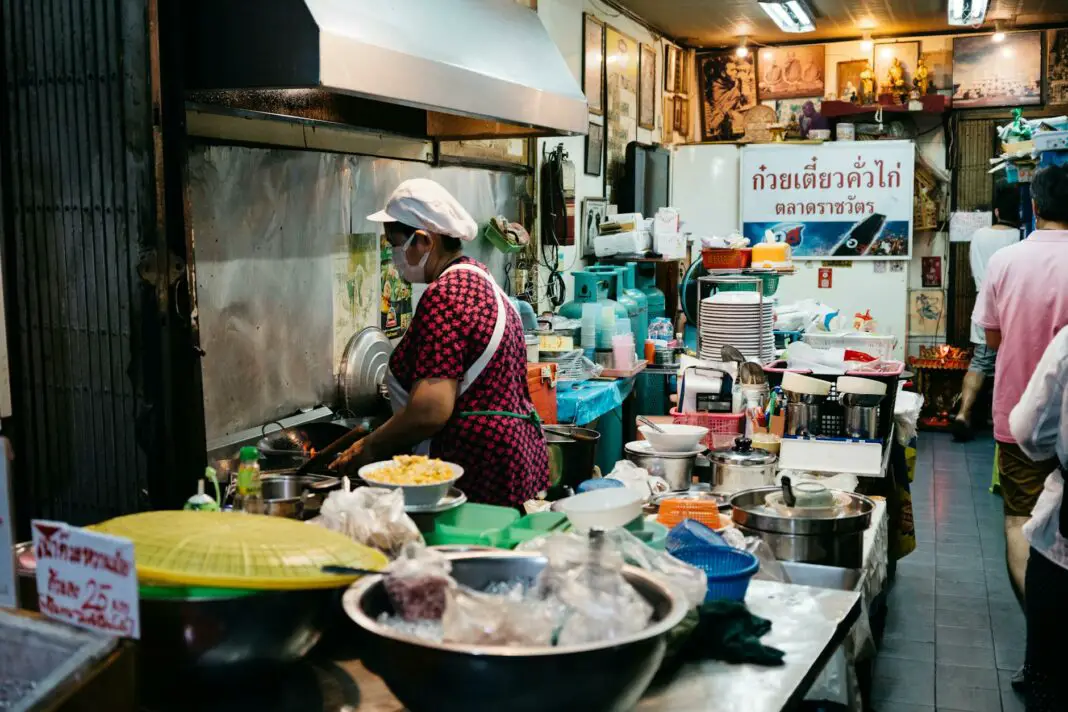Embarking on a trip to Thailand is not just about soaking up the stunning landscapes and rich culture; it’s an unforgettable culinary adventure that awaits every traveler. From bustling street markets to charming local restaurants, the flavors of Thai cuisine are a delightful exploration of zest and freshness. However, what many visitors often miss out on is the secret local ingredients that transform ordinary dishes into culinary magic. This blog post takes you on an enlightening journey through the vibrant world of Thai cuisine, uncovering the unique elements that make it one of the most beloved cuisines globally.
Discover how these indigenous ingredients are meticulously integrated into recipes, creating a symphony of flavors that seduce the palate. Along the way, learn practical tips to identify and use these hidden gems, allowing you to experiment with authentic Thai cooking right in your kitchen. Whether you are planning your trip or reminiscing about your adventures, this guide will enhance your appreciation for the culinary artistry of Thailand.
Table of Contents
- Coconut Milk: The Creamy Foundation
- Lemongrass: Citrusy Freshness
- Kaffir Lime Leaves: Aromatic Essence
- Galangal: The Spicy Root
- Fish Sauce: The Umami Element
- Thai Basil: Herbaceous Bliss
- Palm Sugar: A Sweet Touch
- Creative Cooking Tips for Authentic Thai Dishes
Coconut Milk: The Creamy Foundation
Coconut milk is nothing short of a miracle ingredient in the culinary world of Thailand. Not only does it add a rich, creamy texture to curries and soups, but it’s also versatile enough to be used in desserts. Made by pressing grated coconut meat, this ingredient serves as the backbone of many classic Thai dishes like Tom Kha Gai and Massaman curry. The sweetness of coconut milk perfectly balances the spiciness of chilies, creating a complex flavor profile that is soothing yet invigorating.
Beyond its flavor contributions, coconut milk offers nutritional benefits, bringing in essential vitamins and minerals. It’s an excellent source of healthy fats, which not only enhance taste but also promote satiety. Incorporating coconut milk into your cooking can enhance both the flavor and nutritional value of your meals. Thus, if you aim to elevate your culinary skills, mastering the use of coconut milk is an indispensable step in adding authentic Thai flavors to your dishes.
Lemongrass: Citrusy Freshness
Lemongrass isn’t just a garnish; it’s a key flavor agent that imbues Thai dishes with a vibrant citrusy zing. This tall stalk is often used in soups and curries, delivering a refreshing aroma that invigorates the senses. Infusing dishes with lemongrass can transport your culinary creation to the tropical bliss of Thailand, giving provoke an appetite and elevating even the simplest dishes to a marvellous epicurean experience. Its subtle notes of lemon and ginger create a uniquely delicious flavor that pairs beautifully with other Thai staples.
When utilizing lemongrass in your kitchen, chopping it finely or bruising the stalks before adding them to your dishes ensures maximum flavor release. This technique is essential for extracting its aromatic properties, allowing it to permeate through broths and sauces. Whether you are preparing a soothing bowl of Tom Yum or a fresh salad, lemongrass will undoubtedly add that extra layer of brightness and complexity, making your dish truly unforgettable.
Kaffir Lime Leaves: Aromatic Essence
Kaffir lime leaves are an aromatic powerhouse, providing depth and a refreshing aroma to many Thai dishes. They are distinctive, with bright green color and a unique shape, giving not just flavor but also visual appeal to your culinary creations. The leaves contribute a fragrant citrus flavor that brightens curries, soups, and even marinades. Incorporating them is an essential step in achieving that authentic Thai taste which many chefs and seasoned home cooks strive for.
In Thai cooking, using kaffir lime leaves involves tearing them or finely slicing to release their fragrant oils. Many believe that their essential oils hold the secret to Thai culinary magic. This unique ingredient can also be steeped in coconut milk or infused in broths to create a delicious base bursting with fresh flavors. Understanding the nuance of kaffir lime leaves allows cooks to evoke the essence of Thailand in every bite, emphasizing freshness and aromatic complexity.
Galangal: The Spicy Root
Galangal, often confused with ginger, is an extraordinary root that holds its own place in Thai cuisine. With a distinct flavor profile, its peppery yet earthy notes enhance dishes like curries, soups, and salads. Unlike ginger, galangal has a more robust taste that can elevate any dish’s complexity, making it a non-negotiable ingredient in traditional recipes such as Tom Kha and Pad Thai.
In terms of practical usage, ensure fine slicing or pounding of galangal to blend its flavors seamlessly into your dishes. As it cooks, galangal releases essential oils that invigorate the surroundings with a delightful aroma, making the dining experience not only about taste but also about a sensory journey. Utilizing galangal opens up a world where the boundaries between flavors blur, allowing for culinary creativity to flourish. Embrace galangal, and watch how it transforms your standard meals into extraordinary experiences filled with heat and character!
Fish Sauce: The Umami Element
Fish sauce is an iconic ingredient that captures the essence of umami, making it a staple in Thai cooking. Its rich, savory flavor is derived from fermenting fish, usually anchovies, which lends a complexity that is hard to replicate. Fish sauce is often used in marinades, dipping sauces, and even as a seasoning, enhancing the depth of flavors in dishes like Pad Thai and Som Tum. This ingredient plays a crucial role in balancing the sweet, sour, and spicy elements traditional in Thai cuisine.
Using fish sauce correctly can make or break a Thai dish. It is vital to use it sparingly at first—adding a few drops can go a long way. This allows you to control the flavor while ensuring the distinct saltiness and umami notes shine through without overpowering other tastes. Embracing this ingredient is like opening up a treasure chest of flavor boosts that allows every dish to shine with a deliciously authentic Thai flair.
Thai Basil: Herbaceous Bliss
Thai basil is not your ordinary basil; it brings a unique peppery flavor that invigorates dishes with fresh, herby notes. With its vibrant green leaves and a slight purple hue, it not only enhances the visual appeal but also adds a burst of flavor that is quintessential to many classic overall Thai recipes such as Pad Krapow and green curry. The fragrance of Thai basil is even more pronounced when cooked, releasing its essential oils and enriching the dish.
To get the most out of Thai basil, add it towards the end of cooking to preserve its unique flavor and aroma. Its adaptability also means it can be used fresh in salads or chopped into sauces, providing contrast and complexity. Elevating your culinary repertoire with Thai basil can transport your dishes, creating a link between the kitchen and the bustling street food markets of Thailand. With Thai basil, you are not just cooking; you are creating a culinary interpretation of paradise.
Palm Sugar: A Sweet Touch
Palm sugar is another hidden gem in the world of Thai cooking, providing a gentle sweetness that can soften the robust flavors of chili and fish sauce. Its complex flavor, reminiscent of caramel and molasses, enhances a variety of curries, desserts, and savory dishes alike. Unlike refined sugar, palm sugar adds depth without overwhelming other flavors, making it an ideal choice for authentic Thai cooking. The delicate balance it strikes is essential for dishes like Thai curries and desserts, establishing a harmonious blend of flavors.
Using palm sugar is a delightful alternative that introduces a subtle sweetness while promoting a more wholesome approach to cooking. Its unique qualities can uplift your culinary creations by providing an additional layer of taste. Adjusting its measurement according to your preference allows you to customize your dishes beautifully while retaining the authenticity so treasured in Thai cuisine. By incorporating palm sugar, you are not just sweetening your food; you are gaining insights into a tradition that respects the balance of flavors.
Creative Cooking Tips for Authentic Thai Dishes
To master the art of Thai cooking and truly appreciate these wonderful ingredients, it’s essential to embrace creativity in the kitchen. Start by sourcing fresh, local ingredients, as they offer the vibrant flavors essential for authentic dishes. Whether visiting a Thai market or exploring your local Asian grocery store, look for the freshest herbs and spices available. Experimenting with the ratios of ingredients can lead to discoveries that create unique flavor combinations. Allowing yourself to play with textures and tastes will help you embrace the essence of Thai cuisine.
Consider taking cooking classes during your trip to Thailand as a way to delve deeper into the cultural significance behind these ingredients while honing your cooking skills. Interacting with local chefs can provide unprecedented insights into the intricate balance of flavors. Moreover, document your culinary journeys through social media. Sharing your experiences not only enhances your journey but also inspires others to explore the enchanting world of Thai cooking. Let your passion for culinary adventure guide you, and soon you’ll be turning your kitchen into a Thai-inspired haven filled with vibrant flavors and interesting techniques.
Embark on Your Culinary Adventure
As you prepare for your trip to Thailand, remember that the real magic lies in understanding the unique ingredients that shape your dining experience. Each essential component, from the creamy enchantment of coconut milk to the aromatic allure of kaffir lime leaves, plays a vital role in crafting authentic flavors. Learning to identify these key elements not only enhances your appreciation for Thai cuisine but also empowers you to create delectable dishes in your kitchen long after you’ve returned home.
With every meal, you’ll not only relive your adventures through the vibrant tastes but also cultivate a deeper connection to the rich culinary heritage of Thailand. By embracing the local flavors, you’re not just a consumer of the cuisine but an active participant in its ongoing narrative. So, get ready to embark on a delightful culinary journey that will surely stay with you for years to come.
Frequently Asked Questions
- What is the most important ingredient in Thai cooking?
The most important ingredient can vary depending on the dish, but staples like fish sauce, coconut milk, and fresh herbs are key to achieving authentic flavors. - How can I replicate authentic Thai flavors at home?
Start by sourcing high-quality local ingredients, including essential herbs and spices, and experiment with balancing the sweet, sour, salty, and spicy elements typical of Thai cuisine. - Is it necessary to use all these ingredients for a dish?
While many traditional recipes utilize a range of these ingredients, you can adapt based on your personal taste and availability, allowing for creativity while maintaining a connection to Thai flavors. - Are there vegetarian options in Thai cuisine?
Absolutely! Thai cuisine offers a wide variety of vegetarian options, utilizing fresh vegetables, tofu, and the same rich spices and sauces for depth of flavor.
Image Credit: Pexels





